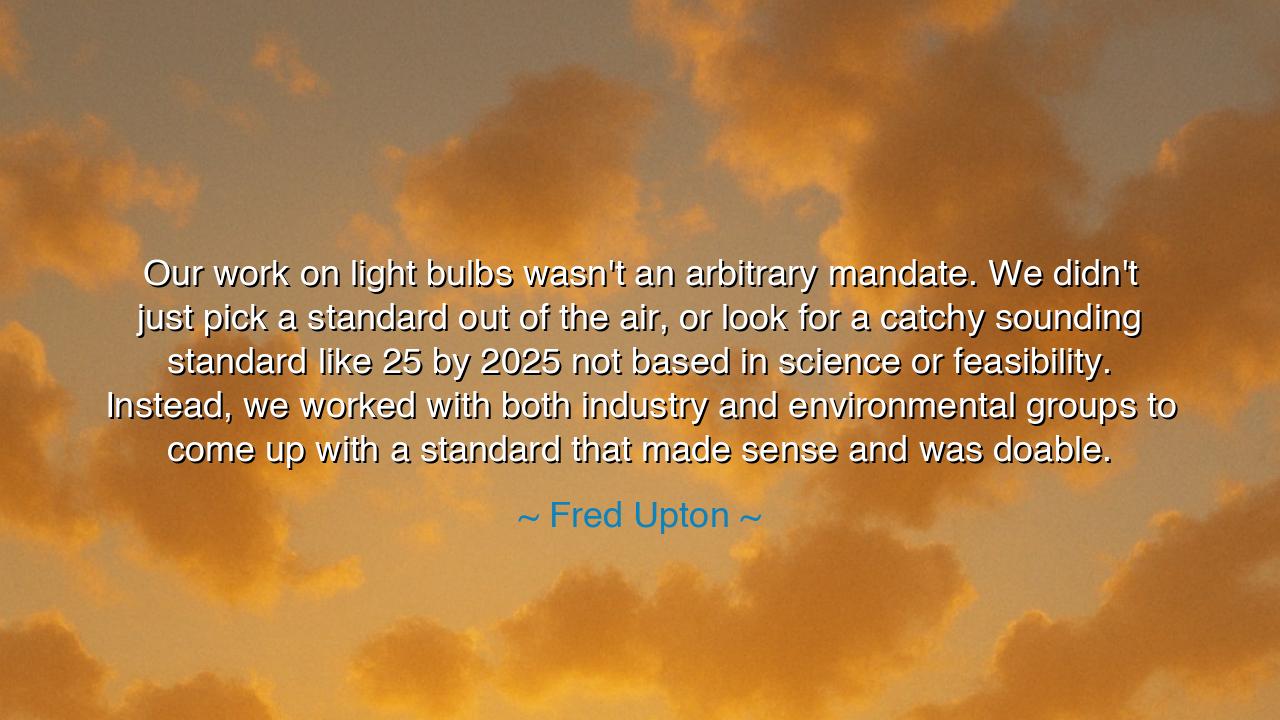
Our work on light bulbs wasn't an arbitrary mandate. We didn't
Our work on light bulbs wasn't an arbitrary mandate. We didn't just pick a standard out of the air, or look for a catchy sounding standard like 25 by 2025 not based in science or feasibility. Instead, we worked with both industry and environmental groups to come up with a standard that made sense and was doable.






Fred Upton, speaking with the voice of reasoned stewardship, once declared: “Our work on light bulbs wasn’t an arbitrary mandate. We didn’t just pick a standard out of the air, or look for a catchy sounding standard like ‘25 by 2025’ not based in science or feasibility. Instead, we worked with both industry and environmental groups to come up with a standard that made sense and was doable.” These words shine like a lantern in the darkened hall of governance, reminding us that progress is not born from slogans or whimsy, but from wisdom, dialogue, and grounded vision.
The meaning of this saying is clear: true leadership does not pursue fleeting applause or hollow promises. Instead, it seeks standards rooted in reality—measured by science, tempered by feasibility, and forged in collaboration between differing voices. Upton reveals the essence of responsible governance: that it is not about arbitrary decrees, nor about chasing popular phrases, but about crafting policies that endure because they are practical and just. His words speak to the eternal balance between ambition and wisdom, between vision and implementation.
The origin of this quote rests in the debates over energy efficiency standards in the United States. As policymakers sought to reduce waste and dependence on inefficient technologies, even something as simple as the light bulb became a battlefield of ideology, economy, and environment. Upton’s words remind us that these changes were not capricious; they were the fruit of long labor, negotiation, and compromise between industry leaders and environmental advocates. In this way, he defended the process, showing it was born not of fancy, but of deliberate design.
History itself bears witness to the power of grounded standards. Consider the Romans, who engineered aqueducts that carried water across valleys and mountains. These marvels were not built upon slogans or arbitrary measures, but upon painstaking collaboration between architects, engineers, and laborers. Their enduring strength came not from haste, but from wisdom rooted in science and feasibility. Just as Rome’s aqueducts sustained generations, so Upton envisioned energy standards that could sustain a modern nation.
There is something deeply emotional in this declaration. For Upton speaks not only of light bulbs, but of the principle of all governance. Too often, nations are tempted by the seduction of empty promises—goals declared without grounding, standards written without thought. Such paths breed only frustration and cynicism. His words call us back to humility: to work not with dreams alone, but with hands in the soil of reality, ensuring that what is promised can indeed be achieved.
To future generations, this quote carries a lesson of unity. It shows that progress arises not when one side triumphs over the other, but when industry and environmental guardians join in dialogue, when vision is joined to practicality. For it is easy to declare lofty goals, but it is far harder—and more noble—to build the bridges of cooperation that make those goals attainable. Upton’s teaching is that true policy is not written in isolation, but hammered into strength upon the anvil of collaboration.
The lesson for us is simple yet profound: in your own life, do not build your standards upon whim or empty words. Ground them in truth, in what is possible, in what brings lasting benefit. When faced with challenges, do not scorn the voices of others—even those who oppose you—but seek to weave their strengths into a greater whole. Practically, this means seeking collaboration, questioning the feasibility of your goals, and refusing to be seduced by empty slogans.
Thus Upton’s words shine as a guiding flame: “Our work on light bulbs wasn’t an arbitrary mandate... Instead, we worked with both industry and environmental groups to come up with a standard that made sense and was doable.” Let all who hear this teaching remember that true progress is forged not in haste, but in wisdom; not in isolation, but in unity; not in slogans, but in standards that endure.






AAdministratorAdministrator
Welcome, honored guests. Please leave a comment, we will respond soon